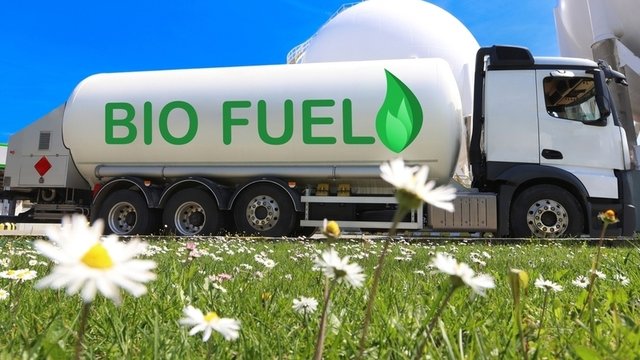
What are biofuels?
Edited on Oct. 17, 2024

Biofuels have been around for decades, but for many years they remained on the sidelines due to the dominance of petrol and diesel. Today, the conversation has shifted. Rising oil prices, global energy insecurity and the urgent need to combat climate change have put biofuels firmly in the spotlight. Policymakers, industries, and researchers are increasingly turning to them as a renewable alternative for sectors such as transport, manufacturing, and even domestic energy consumption.
If you are interested in the sustainability sector and want to train in everything related to the environment, the Master in Sustainability at Universidad Europea will give you the knowledge and skills to lead critical change in the years ahead.
Definition of biofuels
So, what are biofuels exactly? Biofuels are renewable fuels derived from organic sources such as agricultural crops, forestry by-products, algae, or organic waste. Unlike fossil fuels, which take millions of years to form, biofuels are produced relatively quickly and are considered carbon-neutral since the CO2 they release during combustion is partially offset by the CO2 absorbed during the growth of the feedstock.
Biofuels are used to generate electricity, heat, and vehicle propulsion, making them one of the most versatile renewable energy sources. In fact, in compliance with European regulations, most petrol stations are already supplying petrol mixed with up to 10% renewable fuels. Common sources include wheat, sugar beet, sugarcane, and oilseeds.
Understanding what are biofuels and how they are used is key for anyone exploring sustainable energy solutions.
How are biofuels produced?
Biofuels are produced from biomass of plant, animal, or organic origin, using mechanical, biological and thermochemical processes. Here are the main generations of biofuels:
- First-generation biofuels: Produced from food crops such as maize, sugarcane and vegetable oils, resulting in bioethanol and biodiesel. They meet current sustainability standards but raise concerns about land use.
- Second-generation biofuels: Derived from non-food organic waste, such as agricultural residues or forestry by-products. Examples include biogas and biomethane. These reduce landfill waste while generating energy.
- Third-generation biofuels: Extracted from algae and aquatic plants with high oil content. While promising due to high yield potential, they are not yet widely commercialised.
- Fourth-generation biofuels: Still under research, these involve genetically modified microorganisms capable of storing carbon dioxide while producing energy.
By understanding the different production methods, we gain deeper insight into what are biofuels and how they might evolve in the future.
Examples and applications of biofuels
The practical applications of biofuels are wide-ranging, spanning electricity production, heating, and transportation. Here are some of the most common types:
- Biodiesel: Produced from vegetable oils or animal fats, widely used in transport and considered sustainable.
- Hydrobiodiesel: Derived from used cooking oil, emitting fewer greenhouse gases than fossil diesel.
- Biomethane: A purified form of biogas, used for electricity generation, heating, and fuelling vehicles.
- Biobutanol: Produced by fermentation of organic matter; has a higher energy density and is easier to store than ethanol.
- Bioethanol: Fermented from sugar-rich crops like beet or corn; commonly blended with petrol.
- Biogas: Generated from the decomposition of organic matter such as manure, sewage or crop waste.
These examples highlight the diversity of applications and answer in practical terms the question: what are biofuels good for?
Advantages and disadvantages of biofuels
As with any renewable energy solution, biofuels come with both strengths and challenges.
Advantages of biofuels:
- Energy security for countries without fossil fuel reserves.
- Renewable and relatively low-cost source.
- Help reduce greenhouse gas emissions.
- Promote rural development through agricultural use.
Disadvantages of biofuels:
- Pressure on land and water resources.
- Competition with food production.
- Potential loss of biodiversity due to monoculture cropping.
- Limited large-scale infrastructure compared to fossil fuels.
When weighing up what are biofuels and whether they are a long-term solution, these pros and cons play an essential role.
Conclusion: Biofuels and the future of energy
Understanding what are biofuels gives us a clear picture of how they contribute to a more sustainable energy landscape. While challenges remain, they are already playing a crucial role in reducing dependence on fossil fuels and in helping countries meet their climate goals. As new generations of biofuels develop, their potential impact will only grow stronger.
If you are passionate about environmental sustainability, biodiversity, and renewable energy solutions, the School of Sustainability at Universidad Europea offers a wide range of programmes to help you shape a greener future.
Mini Summary
- What are biofuels? Renewable fuels made from organic matter such as crops, algae, and waste.
- How are they produced? Through mechanical, biological, or thermochemical processes from biomass.
- Types and examples: Biodiesel, bioethanol, biogas, biomethane, and more.
- Advantages: Renewable, lower emissions, energy security.
- Disadvantages: Competition with food, land use, and infrastructure challenges.
Article published on Sept. 11, 2024